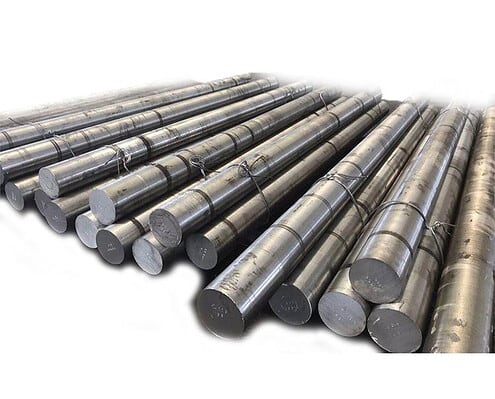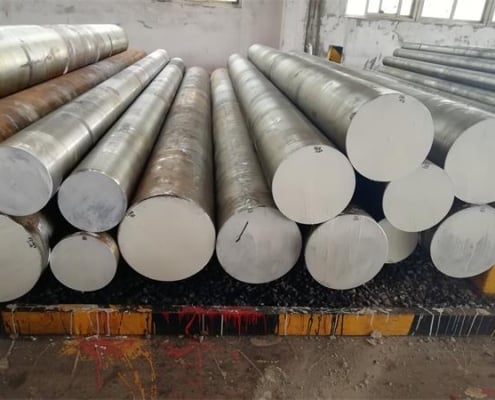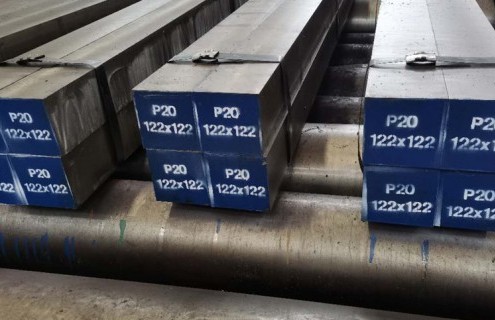1.1730 (c45w) / C45U Tool Steel
1.1730 (c45w) / C45U Tool Steel is manufactured by the electric, flat-furnace or oxy-fuel converter steelmaking method and is characterized by excellent workability and uniform metallographic organization. The steel is affordable, easy to process, and suitable for surface hardening treatments such as high frequency quenching and flame hardening. The steel contains carbon (mass fraction,) ≥ 0.4, excellent wear resistance, but reduced ductility, quenching easy to deformation and cracking, so quenching is important, and tempering must be sharply cooled to avoid tempering brittleness. The steel cutting difficulties, the need for spheroidization treatment to improve cutting performance, in principle, tempered to a hardness of 19 ~ 22HRC, in order to facilitate mechanical processing. Delivery condition and hardness 149~192HBS, 183~255HBS, 229~285HBS.
1.1730 (c45w) / C45U Tool Steel Supply Form & Size
| Form of Supply | Size(mm) | Length(mm) |
| Round bar | Φ6-Φ1,000 | 3,000-10,000 |
| Square bar | 100×100-600×600 | 3,000-6,000 |
| Plate/Sheet | Thickness :20-400 Width:80-1,000 | 2,000-6,000 |
| Flat bar/Blcoks | Thickness :120-800 Width:120-1,500 | 2,000-6,000 |
1.1730 (c45w) / C45U Tool Steel Surface Finish&Tolerance
| Surface Finish | Black-Forged | Black-Rolled | Turned | Grinding | Polished | Peeled | Cold Drawn |
| Tolerance | (0,+5mm) | (0,+1mm) | (0,+3mm) | Best h9 | Best h11 | Best H11 | Best H11 |
Chemical Composition: C45U per EN ISO 4957; 1.1730 per DIN 17350 (Cold Work Tool Steel)
| GRADE | NUMBER | C | Si | Mn | P | S |
| C45U | 0.42-0.50 | 0.15-0.40 | 0.60-0.80 | ≤ 0.030 | ≤ 0.030 | |
| 1.1730 | 0.40-0.50 | 0.15-0.40 | 0.60-0.80 | ≤ 0.035 | ≤ 0.035 |
Mechanical Property
| Yield Rp0.2 (MPa) | Tensile Rm (MPa) | Impact KV/Ku (J) | Elongation A (%) | Reduction in cross section on fracture Z (%) | As-Heat-Treated Condition | Brinell hardness (HBW) |
| 748 (≥) | 994 (≥) | 33 | 11 | 42 | Solution and Aging, Annealing, Ausaging, Q+T,etc | 342 |
Physical Property
| Temperature (°C) | Modulus of elasticity (GPa) | Mean coefficient of thermal expansion 10-6/(°C) between 20(°C) and | Thermal conductivity (W/m·°C) | Specific thermal capacity (J/kg·°C) | Specific electrical resistivity (Ω mm²/m) | Density (kg/dm³) | Poisson’s coefficient, ν |
| 11 | – | – | 0.43 | – | |||
| 154 | 984 | – | 41.3 | 414 | – | ||
| 129 | – | 23 | 12.2 | 322 | 123 |
Heat Treatment
Heat treated : 1194°C – 1155°C
1.1730 (c45w) / C45U Tool Steel
If you’re on the hunt for the 1.1730 (c45w) / C45U Tool Steel, we got you! We here at Waldun are more than welcoming to all our prospective clients.
In this guide, we’ll not only discuss what 1.1730 (c45w) / C45U tool steel is. You will also find out where you can get the best and the highest quality of 1.1730 or C45U tool steel.
What is 1.1730 (C45W) / C45U Tool Steel?
This particular type of steel is a medium type of carbon that is unalloyed.
What 1.1730 or C45U tool steels look like
It offers decent tensile strengths that can both be tempered and hardened so that it can be used for applications that require moderate wear resistance and usual surface hardness levels.
It’s not alloyed, meaning, it doesn’t have alloying elements that make up for its overall chemical composition.
What Are Unalloyed Steels?
Unalloyed steels are easy and simple to understand. They’re simply alloys that are a combination of iron and carbon that do not have any alloying elements.
Image of what unalloyed steels look like
More often than not, unalloyed steels contain carbon content that’s within 0.05 to 2% (at the maximum); apart from that, you can also expect these unalloyed steels to have natural components of phosphorus, sulfur, and manganese.
What is the Hardest Tool Steel?
There’s not an exact type of tool steels that are considered the hardest.
Toolox steels, part of the hardest tool steels
If we were to look at tool steels that are the hardest, they’re “Toolox Steels.” On the opposite end if the rope, you can consider vanadium carbides to be the toughest tool steel naturally.
What is the Hardness of Tool Steel?
You’ll want to use tool steels for machining tools like for chipping and cutting. Tool steels that have been hardened can reach up to a total of 58 to 64 HRC.
Typically, though, tool steels will reach up to 60 to 62 HRC if they’re treated and handled properly. There are, however, tool steels that can be used up to a maximum of 66 HRC.
1.1730 (C45W) / C45U Tool Steel vs. 1.1191 Steel
One of the most common comparisons you can do with 1.1730 tool steels is with 1.1191.
Image of 1.1191 steels you can purchase in round bars
In other words, they’re the two most frequently compared and weighted steels in the market.
While most people think that they’re almost the same, they’re actually not. 1.1730 tool steels contain 0.42 to 0.50% of Carbon, and about 0.60 to 0.80% of Manganese. 1.1191, on the other hand, contains the same levels of carbon, but only has a range of 0.50 to 0.80% Manganese.
C45U Steel Equivalents
Since C45u steel is the same as 1.1730 steel, the equivalent steels of it are just akin to that of 1.1730 steels, and C45U alone is one of them.
What is the Melting Process of 1.1730 Tool Steel?
The typical melting point of 1.1730 tool steels is between 1,370 to 1,400 degrees Celsius.
Melting procedure of 1.1730 tool steel
On the opposite end of the rope, the service temperature of 1.1730 tool steel is at 0 to 500 degrees Celsius.
What is SKD61 Steel?
SKD61 steel is a type of steel that contains high chromium levels that, of course, have high levels of hardness and wear resistance after they’ve been treated and hardened.
Sample image of what SKD61 steel looks like
In addition to that, you can also expect SKD61 steel to have decent levels of hot hardness and dimensional stability.
It’s a good alternative to 1.1730 or C45U tool steels because of their properties and overall features.
Where Do You Usually Use 1.1730 Carbon Tool Steel?
Due to its high concentration levels of carbon, you’ll be able to use carbon tool steels for a wide array of applications.
Jig and die construction
Some of its most common ones include:
- Die sets
- Mold Bases
- Frames, Plates, and Molds
- Jig and Die Constructions
- Molds’ Unhardened Parts
- Bolsters
- Guide Plates
- And Many Other General Engineering Applications
How Do You Perform Tempering on 1.1730 or C45U Tool Steels?
You can temper 1.1730 steels when they’re still warm for the touch of hand. Then, you’d have to reheat it to the tempering temperature and soak for one (1) full hour every 25 millimeter of the total thickness.
How to Cool 1.1730 Tool Steels?
Sample image of air cooling 1.1730 tool steels
Unlike other carbon tool steels, it is advisable to cool or to have 1.1730 cooled in air.
What are the Supply Forms of 1.1730 (C45W) / C45U Tool Steel
You can purchase 1.1730 or C45U tool steel in quite a lot of different supply forms.
Steel sheets – one the most common supply forms of 1.1730 steel
To name a few of the most common supply forms, you’ll be able to purchase them in:
- Diameter Shapes
- Flat Shapes
- Plate Shapes
- Round Bar Shapes
- Hexagonal Shapes
- And Many More!
The supply forms would not really matter because of the fact that you can actually purchase 1.1730 (C45W) or C45U tool steels in custom shapes and forms!
Yes, you read that right, you’ll never have problems and troubles in getting the supply forms you need specifically for your business.
You will be able to contact your 1.1730 tool steel manufacturer to produce the specific supply forms you require!
Where Can You Purchase the Best 1.1730 or C45U Tool Steels?
Here with us at Waldun Steel, you’ll never have a problem in purchasing 1.1730 steels. We’re deemed and considered as the best and the most sought-after 1.1730 tool steels manufacturer – even by businesses from other countries!
Unlike other suppliers, we don’t have a minimum order quantity or an MoQ for our services, you can purchase the specifics of what your businesses need!
Dial us today and we’ll be quick enough to help you in supplying the 1.1730 tool steels that you need!
When you work with us, you’ll surely not feel the need to look for a different 1.1730 or C45U tool steel manufacturer ever again!
Page Contents
- 1.1730 (c45w) / C45U Tool Steel Supply Form & Size
- 1.1730 (c45w) / C45U Tool Steel Surface Finish&Tolerance
- Chemical Composition: C45U per EN ISO 4957; 1.1730 per DIN 17350 (Cold Work Tool Steel)
- Mechanical Property
- Physical Property
- Heat Treatment
- 1.1730 (c45w) / C45U Tool Steel
- What is 1.1730 (C45W) / C45U Tool Steel?
- What Are Unalloyed Steels?
- What is the Hardest Tool Steel?
- What is the Hardness of Tool Steel?
- 1.1730 (C45W) / C45U Tool Steel vs. 1.1191 Steel
- C45U Steel Equivalents
- What is the Melting Process of 1.1730 Tool Steel?
- What is SKD61 Steel?
- Where Do You Usually Use 1.1730 Carbon Tool Steel?
- How Do You Perform Tempering on 1.1730 or C45U Tool Steels?
- How to Cool 1.1730 Tool Steels?
- What are the Supply Forms of 1.1730 (C45W) / C45U Tool Steel
- Where Can You Purchase the Best 1.1730 or C45U Tool Steels?



















